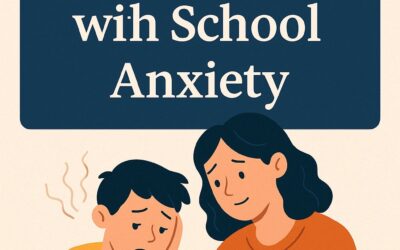Anxiety and defiance in children can often be interconnected. Adults often expect anxious children to be shy, cautious, clingy, or worried. But anxiety can look differently depending on the child, fears, and situation. For instance, some children with anxiety display problematic behaviours like defiance, anger, or tantrums.
For them, the anxiousness creates an overwhelming need to get out of a situation that makes them very uncomfortable. They want to escape the problem but don’t have the skills, abilities, or self-awareness to express the feelings of anxiety driving the outbursts.
Unfortunately, acting out can also lead to additional problems at school, at home, or in social situations, further triggering the child’s anxiety. In this article, we explore why children with anxiety act out, signs that the problematic behaviours are due to anxiety, and how therapy can help children work through difficult feelings and acting out.
Why do some children with anxiety respond with disruptive behaviours like defiance?
Let’s imagine that a classroom teacher calls on an 8-year-old student to read a question out loud and answer it, just like other classmates had done. Yet instead of complying, the child yells “No”, throws the textbook on the ground, and starts to run from the classroom. At first glance, these behaviours can seem like problems with anger or defiance. Yet, a child with severe anxiety, who fears making a mistake, being criticized, or who struggles with social anxiety, could be lashing out to escape this feared and uncomfortable situation.
Anxiety isn’t one set of feelings or reactions. It presents in various ways because it involves a physiological response to a perceived threat in the person’s environment. The person’s response is often driven by a flight or fight reaction, which can vary per individual. So some children with anxiety respond by withdrawing, becoming quiet, or freezing. Others react with a need to get out of the situation or get away from the triggers in any way they can, causing them to act out. These disruptive actions can often be perceived as anger, opposition, or defiance.
Yet, the problematic behaviours serve a purpose for the child — helping them to avoid or escape anxiety-inducing situations. They may act out to try and get some control in a situation where they feel helpless or anxious — not due to lack of discipline. For instance, their reactions may help them avoid fears of embarrassment, helplessness, hurts, discomfort, or overwhelm. Additionally, they may struggle with loss, grief, loneliness, frustrations, or insecurities. So even though their reactions are disruptive, the responses are driven by anxiety, stress, fears, or helplessness.
Signs that disruptive behaviours are due to anxiety instead of oppositional defiant disorder or ADHD
For the anxious child, the worries, stress, and fears can be overwhelming — taking a toll on their ability to manage and cope. Additionally, young children may not fully understand why they feel as they do or react the way they do. Therefore, it’s important to start understanding why they react the way they do. But often, the child simply doesn’t have the skills, ability, or self-awareness to express what’s driving their behaviours. Some signs that can indicate the disruptive behaviours are due to anxiety include:
- Difficulty tolerating criticism. The child may avoid situations where they may make mistakes or avoid receiving feedback. They don’t accept criticism well, even constructive approaches, and can get defensive, angry, or act out.
- Disruptive behaviour at school. Anxiety can lead to the child feeling frustrated and overwhelmed. They may not feel able to manage stressful interactions or situations or keep themselves safe. So they act out to escape. Since children with ADHD or defiant behaviours can also be disruptive, it’s important to look for patterns or clues that trigger the problems, especially if the child can’t express what they’re feeling or experiencing.
- Problems in social situations. Children with social anxiety can display their anxiousness by acting out, such as yelling, throwing objects, fighting, or trying to run away from the situation. They may also be quicker to anger compared to peers.
- Unpredictable reactions. When anxiety is underlying the acting out, it can sometimes be difficult to predict how the child will react. The outburst or tantrums can feel sudden and unexpected.
Examples of disruptive behaviours due to unrecognized anxiety
It can be challenging at first to determine why a child is acting out. However, looking for patterns, including what happened before the disruptive behaviour, can help. Here are some problematic behaviours that can be seen in children with anxiety:
- Excessive clinging
- Tantrums and meltdowns
- Yelling
- Arguing
- Throwing objects
- Hitting, kicking, or biting
- Running away from the situation
- Noncompliance with instructions at school or home
- Difficulty focusing or appearing like they aren’t paying attention
- Irritability
Many of these examples can also be seen in children with defiant disorders or ADHD. However, the patterns, reasons, and triggers that cause the behaviours will be different. For instance, children with ADHD may act out due to problems with attention or concentration. They may get up and wander around the classroom because they lost their focus, not because they’re trying to avoid a perceived stressful situation, as a child with anxiety would.
Building Resilience in Children with Anxiety and Defiance: How therapy can help children with disruptive behaviours due to anxiety
It can be stressful and scary when a child is displaying extreme, disruptive behaviours. As a parent or teacher, you want to understand the reason why they’re acting out and to help the child find a different, more productive, way of responding to difficult situations. But it can be hard to do it on your own. Professionals, like therapists who specialize in working with children, can help you and your child get to the root of the problem and learn skills and strategies to work through anxiety and disruptive behaviours. So your child feels better, more in control of themselves, and can thrive. The specific strategies used may vary based on your child’s situation, age, and needs. However, here are some common ways therapy can help children with anxiety or disruptive behaviours.
Clarify presenting issues and underlying causes
The therapist will work with you and your child to gain clarity on what’s happening, how your child and others in their life are being impacted, and also help with ruling out other contributing factors, like co-occurring disorders. This step can help guide what types of therapeutic approaches and support will best help your child.
Express their feelings and thoughts
Your child may not be able to fully understand or express what they’re feeling or why they’re reacting the way they do. Therapy can help them get in touch with their inner world and learn more productive ways to express themselves. Over time, they can begin to respond in ways that help them manage or get the support they need — instead of acting out.
Learn strategies and coping skills to manage their anxiety and defiance
Therapists will work with your child to help them learn age-appropriate coping skills and strategies that help them manage their feelings and behaviours. They may also work together to help your child better identify their emotions and early warning signals that they’re getting too stressed, anxious, or overwhelmed. So with practice, your child begins to learn how to manage their anxiety constructively and proactively instead of reacting in anger or acting out.
Collaborate with family or schools
Depending on the situation and the child’s needs, the therapist may also provide insights and strategies with family or teachers. This step can help others better understand your child’s reactions and let them share effective methods to support your child. As a result, this can help decrease outbursts, increase your child’s use of coping skills, and provide effective interventions that may de-escalate a situation.





